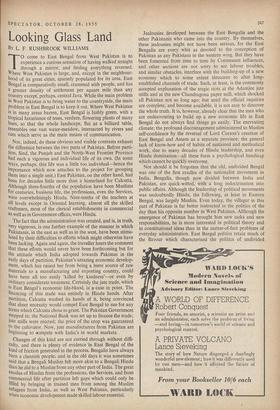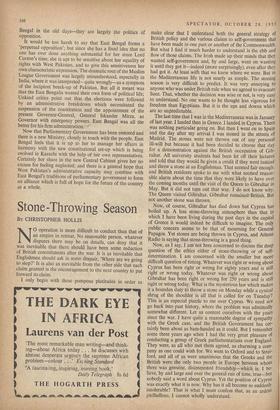Looking Glass Land
By L. F. RUSHBROOK WILLIAMS Nor, indeed, do these obvious and visible contrasts exhaust the difference between the two parts of Pakistan. Before parti- tion, Sind, the Punjab and the North-West Frontier Province had each a vigorous and individual life of its own. (In some ways, perhaps, this life was a little too individual—hence the importance which now attaches to the project for grouping them into a single unit.) East Pakistan, on the other hand, had been for decades little more than a hinterland for Calcutta. Although three-fourths of the population have been Muslims for centuries, business life, the professions, even the Services, were overwhelmingly Hindu. Nine-tenths of the teachers at all levels except in Oriental learning, almost all the skilled craftsmen, most of the clerical establishments in commercial as well as in Government offices, were Hindu.
The fact that the administration was created, and is, in truth, very vigorous, is one further example of the manner in which Pakistanis, in the east as well as in the west, have been stimu- lated by their difficulties to efforts which might otherwise have been lacking. Again and again, the traveller hears the comment that these efforts would never have been forthcoming but for the attitude which India adopted towards Pakistan in the early days of partition. Pakistan's amazing economic develop- ment, which has raised her from being a 'mere source of raw materials to a manufacturing and exporting country, could have been all too easily killed by kindness'—or even by ordinary considerate treatment. Certainly the jute trade, which is East Bengal's economic life-blood, is a case in point. The financing of this trade was entirely in Hindu hands. After Partition, Calcutta washed its hands of it, being convinced that sheer necessity would compel East Bengal to sue for any terms which Calcutta chose to grant. The Pakistan Government stepped in; the National Bank was set up to finance the trade; Jute mills were erected; the price of the crop was guaranteed to the cultivator. Now, jute manufacturers from Pakistan are beginning to compete with India's in world markets.
Changes of this kind are not carried through without diffi- culty, and there is plenty of evidence in East Bengal of the kind of friction generated in the process. Bengalis have always been a clannish people; and in the old days it was sometimes said that a Bengali Muslim felt more akin to a Bengali Hindu than he did to a Muslim from any other part of India. The great exodus of Hindus from the professions, the Services, and from Commercial life after partition left gaps which could only be filled by bringing in trained men from among the Muslim refugees from India, as well as West Pakistan, particularly When economic development made skilled labour essential. Jealousies developed between the East Bengalis and the other Pakistanis who came into the country. By themselves, these jealousies might not have been serious, for the East Bengalis are every whit as devoted to the conception of Pakistan as any Pakistani in the western wing. But they have been fomented from time to time by Communist influences, and other sections are not sorry to see labour troubles, and similar obstacles, interfere with the building-up of a new economy which to some extent threatens to alter long- established channels of trade. Such, at least, is the commonly accepted explanation of the tragic riots at the Adamjee jute mills and at the new Chandragona paper mill, which shocked all Pakistan not so long ago; .but until the official inquiries are complete, and become available, it is not easy to discover the whole truth. It is, however, already clear that the men who are endeavouring to build up a new economic life in East Bengal do not always find things go easily. The enervating climate; the profound discouragement administered to Muslim self-confidence by the reversal of Lord Curzon's creation of East Bengal and Assam as a separate province; the general lack of know-how and of habits of sustained and methodical work, due to many decades of Hindu leadership, and even Hindu domination—all these form a psychological handicap which cannot be quickly overcome.
Nor should it be forgotten that the old, undivided Bengal was one of the first cradles of the nationalist movement in India. Bengalis, though now divided between India and Pakistan, are quick-witted, with a long indoctrination into public affairs. Although the leadership of political movements was undoubtedly Hindu, the following, at least in Eastern Bengal, was largely Muslim. Even today, the villager in this part of Pakistan is far better instructed in the politics of the day than his opposite number in West Pakistan. Although the emergence of Pakistan has brought him new tasks and new responsibilities, he is more interested in political theory and in constitutional ideas than in the matter-of-fact problems of everyday administration. East Bengal politics retain much of the flavour which characterised the politics of undivided Bengal in the old days—they are largely the politics of opposition.
It would be too harsh to say that East Bengal forms a `perpetual opposition'; but since she has a fixed idea that no one has ever done anything substantial for her since Lord Curzon's time, she is apt to be sensitive about her equality of rights with West Pakistan, and to give this sensitiveness her own characteristic expression. The dramatic rout of the Muslim League Government was largely misunderstood, especially in India, where it was interpreted—quite wrongly—as a symptom of the incipient break-up of Pakistan. But all it meant was that the East Bengalis wanted their own form of political life; Unkind critics point out that the elections were followed by an administrative breakdown which necessitated the suspension of the constitution and the appointment of the present Governor-General, General Iskander Mirza, as Governor with emergency powers. East Bengal was all the better for his firm administration...
Now that Parliamentary Government has been restored and there is a new Ministry, closely in touch with the people, East Bengal feels that it is up to her to manage her affairs in harmony with the new constitutional set-up which is being evolved in Karachi with the help of her own representatives. Certainly her share in the new Central Cabinet gives her no excuse for feeling neglected; and there is a general hope that West Pakistan's administrative capacity may combine with East Bengal's traditions of parliamentary government to form an alliance which is full of hope for the future of the country as a whole.



































 Previous page
Previous page